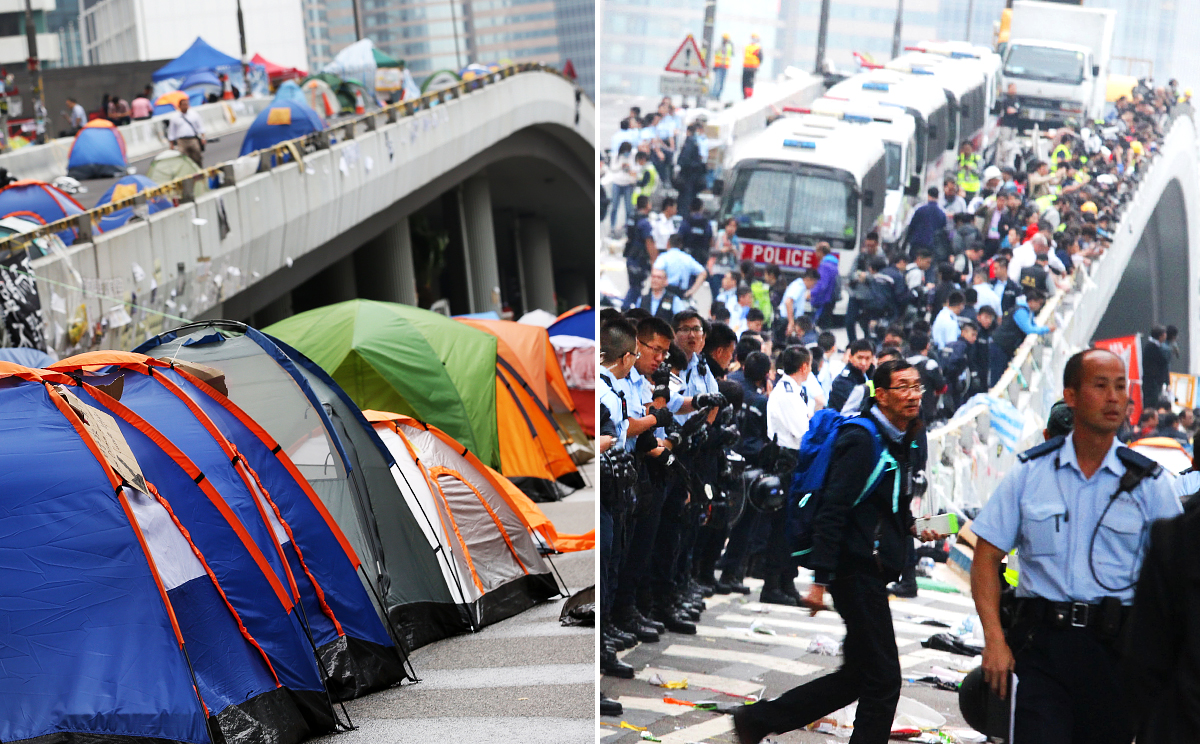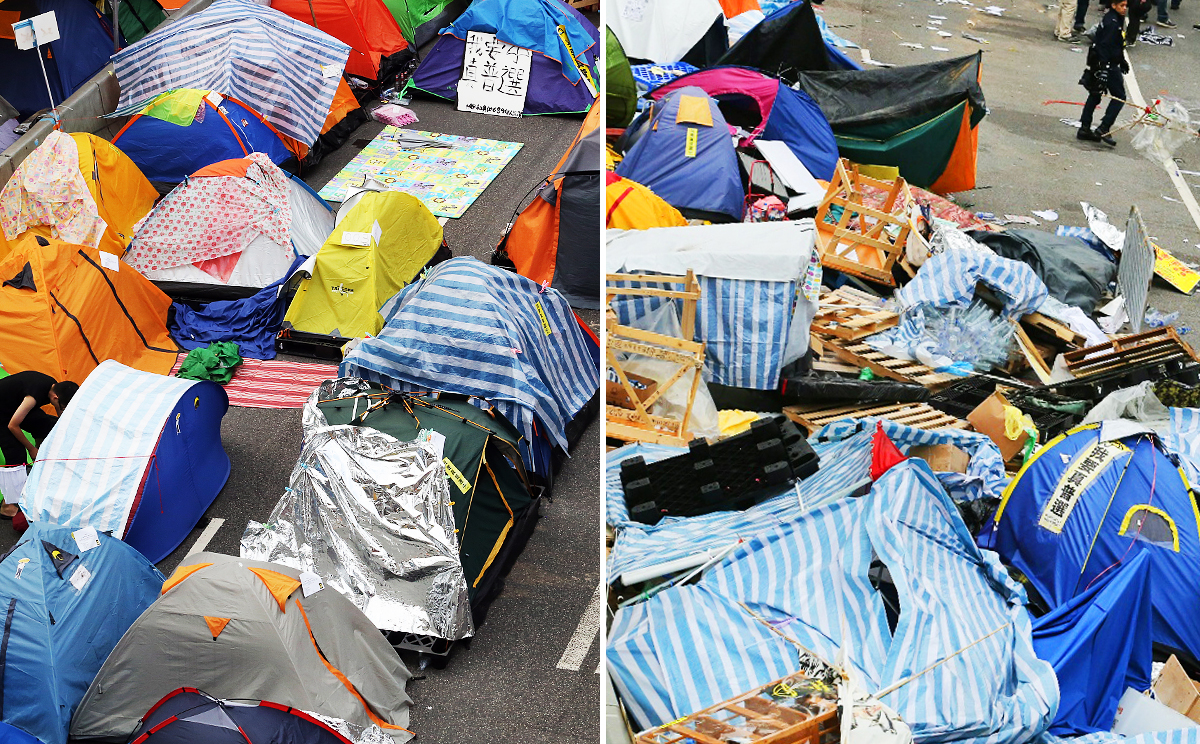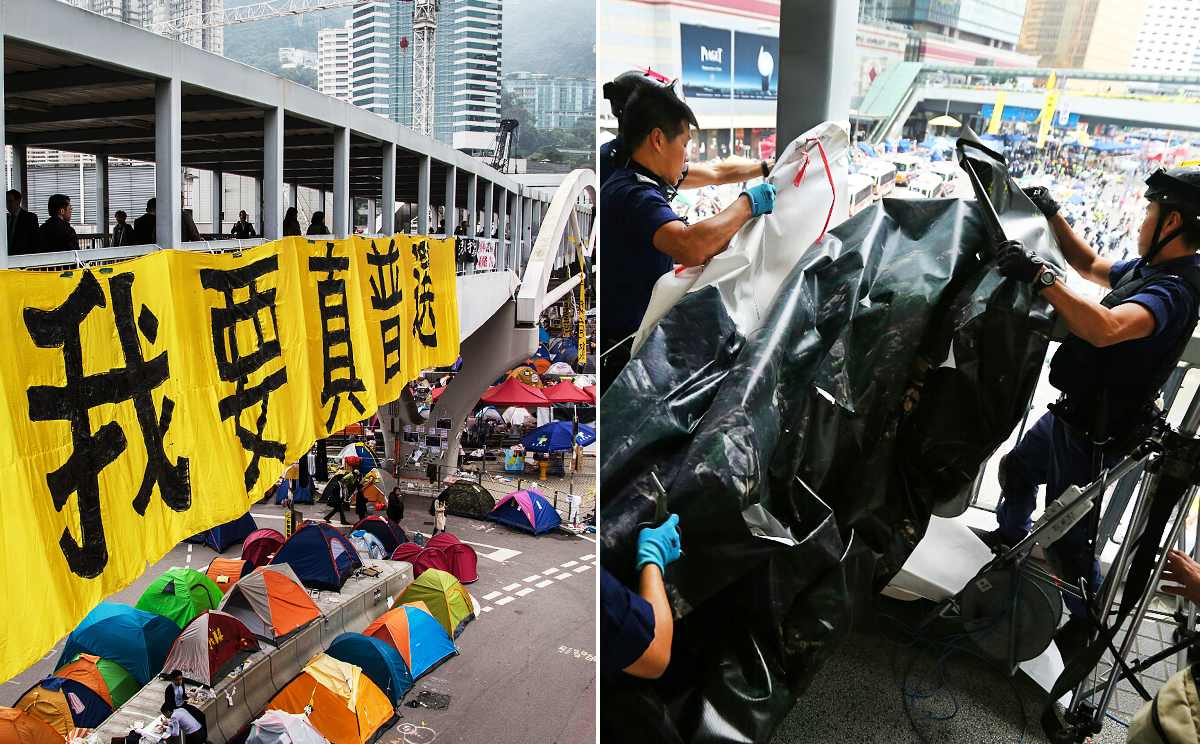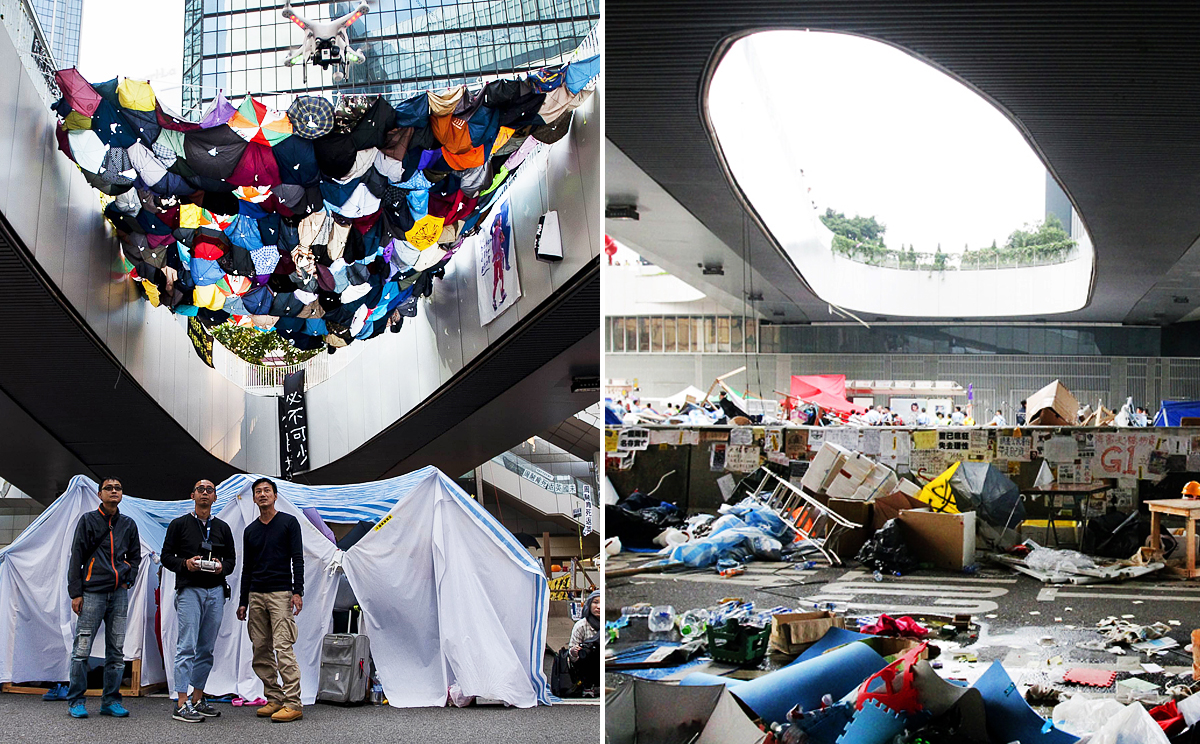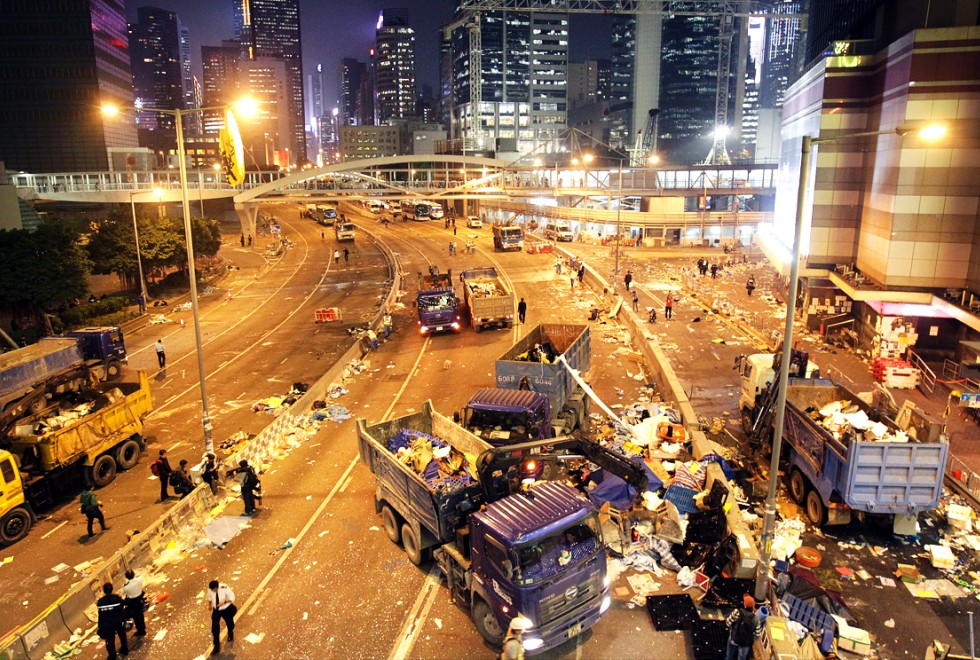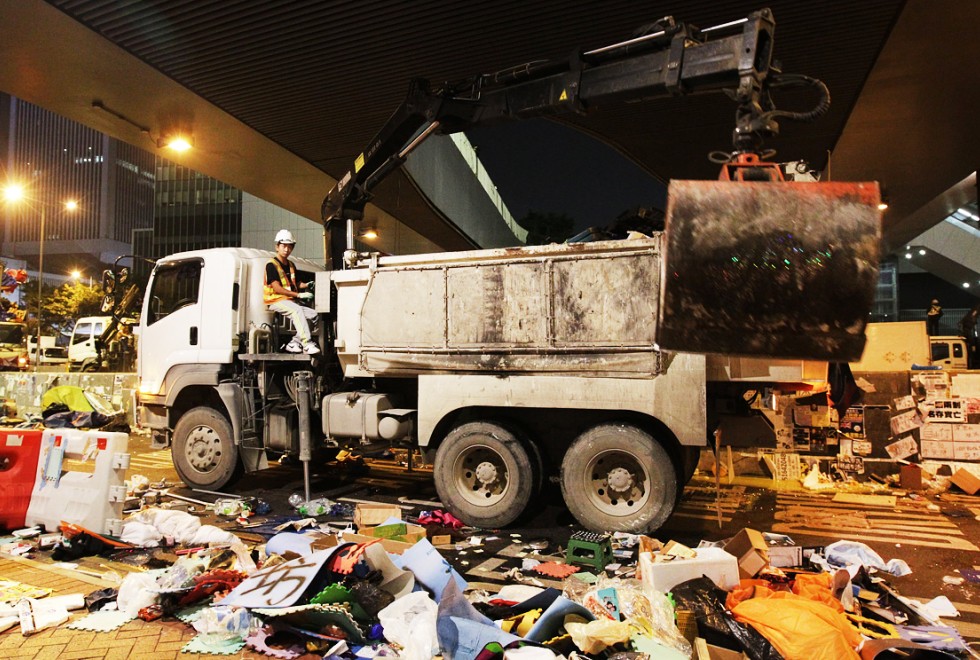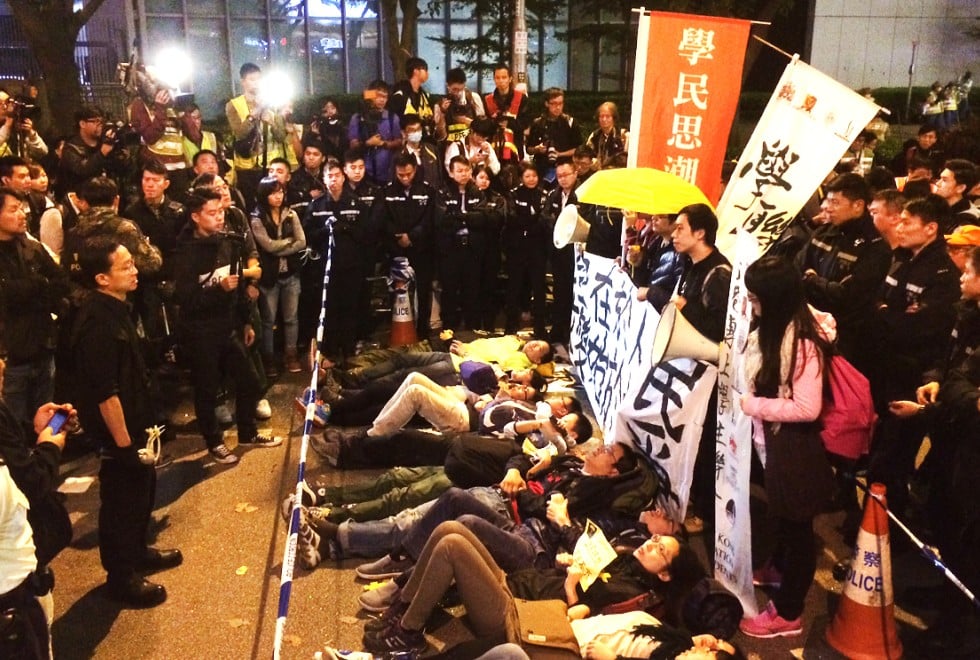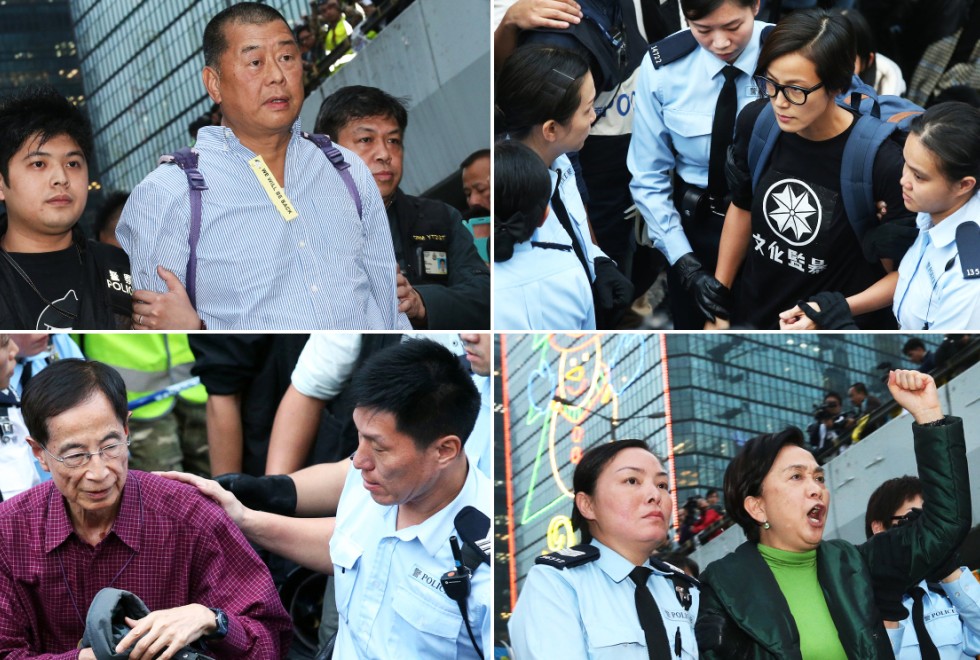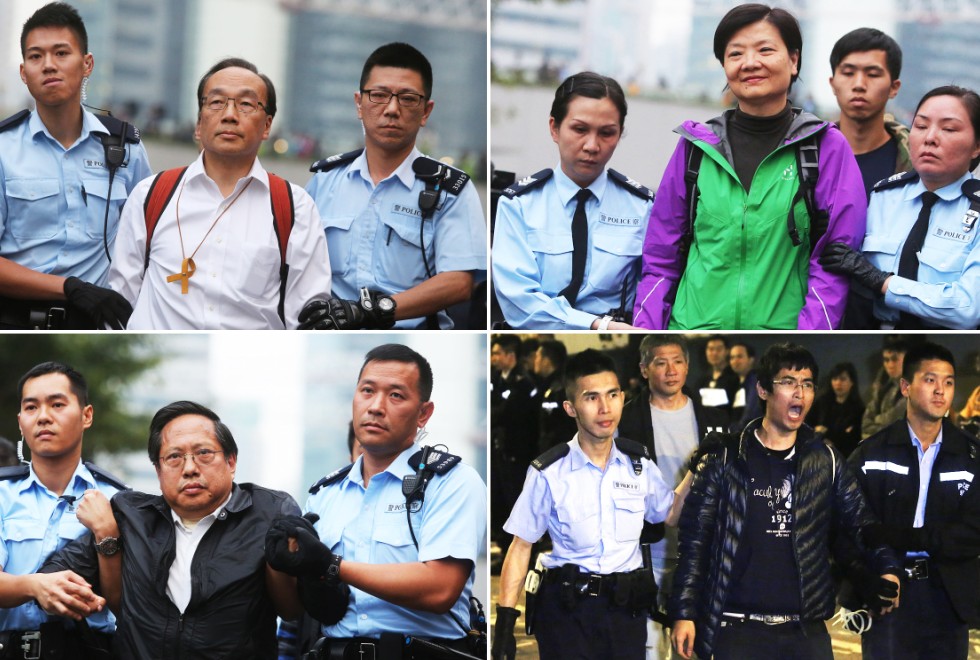-
IP addresses are NOT logged in this forum so there's no point asking. Please note that this forum is full of homophobes, racists, lunatics, schizophrenics & absolute nut jobs with a smattering of geniuses, Chinese chauvinists, Moderate Muslims and last but not least a couple of "know-it-alls" constantly sprouting their dubious wisdom. If you believe that content generated by unsavory characters might cause you offense PLEASE LEAVE NOW! Sammyboy Admin and Staff are not responsible for your hurt feelings should you choose to read any of the content here. The OTHER forum is HERE so please stop asking.
You are using an out of date browser. It may not display this or other websites correctly.
You should upgrade or use an alternative browser.
You should upgrade or use an alternative browser.
#OccupyCentral thread: Give me Liberty or Give me Death!
- Thread starter Asterix
- Start date
- Joined
- Nov 13, 2014
- Messages
- 272
- Points
- 0
'Don't forget the original goal': new pro-democracy banner slung on Hong Kong's Victoria Peak
PUBLISHED : Tuesday, 16 December, 2014, 4:23pm
UPDATED : Tuesday, 16 December, 2014, 4:24pm
Sarah Karacs
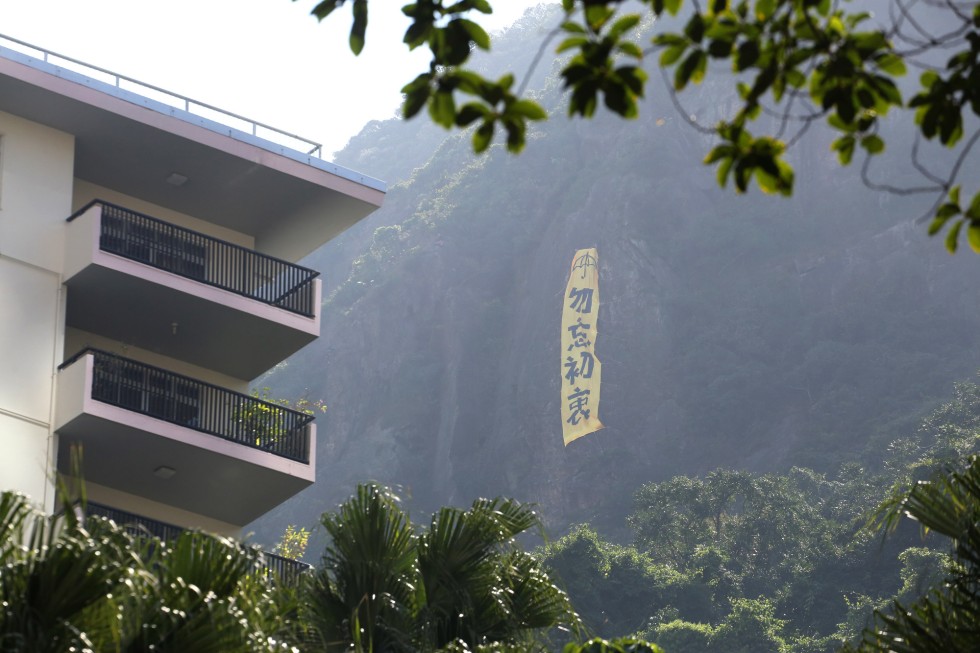
A new banner calling for people not to forget the goals of Occupy hangs on a vertical face at Victoria Peak: Photo: Felix Wong
An impressive feat of mountaineering today saw yet another giant banner hung up in Hong Kong, this time on Victoria Peak.
Sporting the wording 'Don't forget the original goal' - in reference to protesters ongoing push for universal suffrage - the giant yellow sign is the fourth to have been put up by Occupy supporters over the last couple of months.
Measuring six metres long by a metre wide, the yellow and black banner was held to the cliff by several cables.
Monday saw the dismantling of Hong Kong’s last occupied zone in Causeway Bay, bringing an end to the movement that has made headlines across the world.
Last Saturday a banner of similarly large proportions - measuring six metres by two metres - was hung from Devil's Peak near Kowloon, bearing a message calling for Hong Kong Chief Executive CY Leung to resign.
And previously, on two separate occasions, the distinctive banners were hung from Lion Rock in the New Territories.
The first appeared in October, a few weeks after the so-called Umbrella Movement got underway.
Bearing the words “I want real democracy”, the huge banner struck a chord with Hongkongers on social media, prompting a glut of related memes featuring Lions and yellow cats with the caption “spirit of Lion Rock” to go viral.
Erected by a group of rock climbers calling themselves “The Hong Kong Spidie” - after comic hero Spiderman - it was taken down a day later after the Agriculture, Fisheries and Conservation Department of Hong Kong vowed to remove it.
In a video that appeared across social media, a man dressed as Spiderman cited the motivations behind the original Lion Rock banner.
"The chief executive only cares about the rich people living on Victoria Peak… We think the spirit of Lion Rock isn't just about money.” he said.
"The people fighting for real universal suffrage all over Hong Kong have shown great perseverance. This kind of fighting against injustice, strength in the face of troubles, is the true Lion Rock spirit."
- Joined
- Nov 13, 2014
- Messages
- 272
- Points
- 0
Hong Kong rights groups set up database on Occupy police violence complaints
PUBLISHED : Tuesday, 16 December, 2014, 10:58pm
UPDATED : Wednesday, 17 December, 2014, 12:51am
Samuel Chan [email protected]
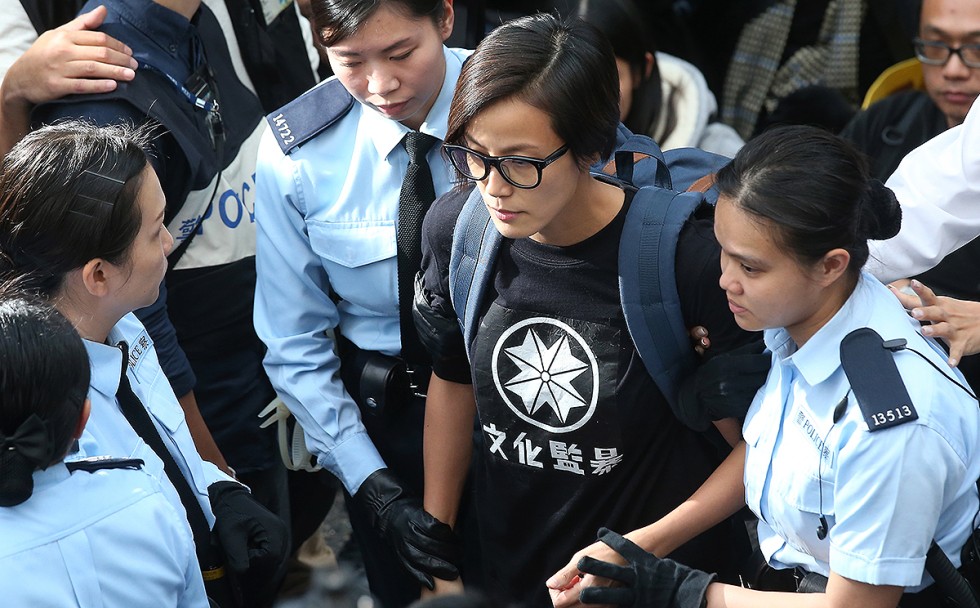
Police officers take away singer and actress Denise Ho Wan-see while police removed barricades and tear down tents at the Occupy protest site in Admiralty. Photo: K. Y. Cheng
Several human rights groups have set up a database to collect visual or written accounts of police violence as an alternative to evidence collected by the force's internal complaints mechanism, which they said lacked credibility.
"The public now feels helpless because the [complaints] mechanism has failed to protect their rights, and they don't know where they can air their grievances," said Canto-pop singer Denise Ho Wan-see from Hong Kong Shield, a group of more than 50 local cultural figures and one of five groups behind the project.
The groups say that Police Commissioner Andy Tsang Wai-hung is "the source of the force's abuse of power and excessive use of violence".
The groups are calling on the force to set a deadline for the completion of investigations into complaints.
Officially known as the Police Violence Database in Umbrella Movement, witnesses or victims of police violence or abuse of power are urged to submit details of the event and photos or video clips through an online form on its Facebook page.
A team of over 10 psychiatrists and registered social workers would be available to meet the victims to verify their claims, as well as to offer psychological support if necessary, said Albert Lai Kwong-tak from think tank The Professional Commons.
The groups would then compile a report to be submitted to the Legislative Council as well as international bodies such as the United Nations Human Rights Committee and the Committee Against Torture.
On the security of the data that is submitted, the groups said experienced local cybersecurity experts would offer protection against theft or cyberattack, though they admitted such risks could not be avoided entirely.
In response, a police spokesman reiterated that all complaints the force received would be handled "in a fair and impartial manner".
Samuel Chan
- Joined
- Nov 13, 2014
- Messages
- 272
- Points
- 0
Re: UN supports HK protestors!!!
Victoria harbour fireworks will not be halted by Occupy, say organisers
Organisers insist Victoria Harbour event will not be affected by the recent protests
PUBLISHED : Tuesday, 16 December, 2014, 11:02pm
UPDATED : Wednesday, 17 December, 2014, 2:08am
Amy Nip [email protected]
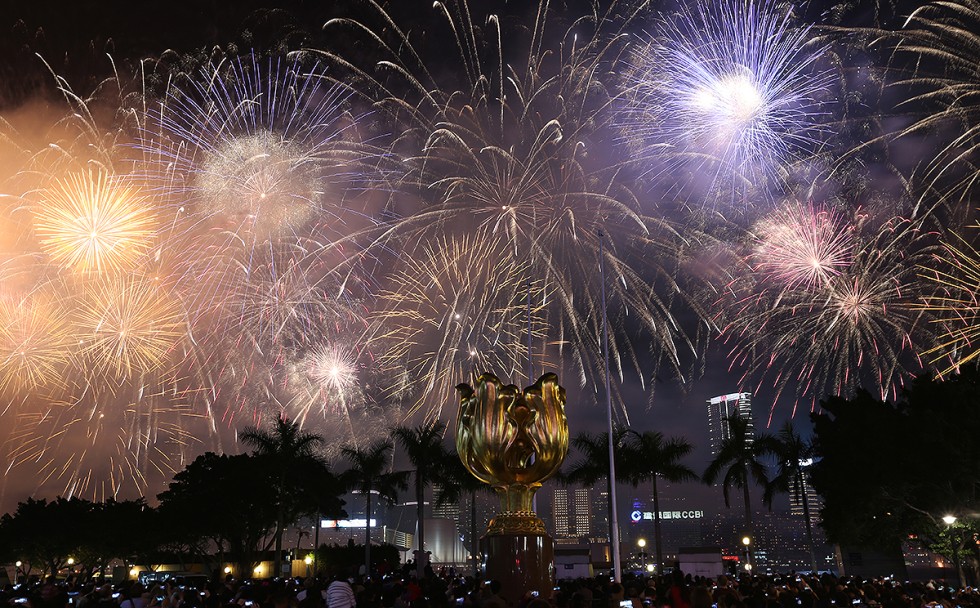
The Tourism Board has vowed to continue its annual New Year countdown over Victoria Harbour. Photo: David Wong
The show will go on. The Tourism Board has vowed to continue its annual New Year countdown over Victoria Harbour despite political instability in the wake of the Occupy protests.
However, the board will liaise with the police on a daily basis, starting nine days before the event.
The biggest countdown event in town, "New Year New World - Hong Kong Countdown Celebrations", will begin eight minutes before midnight on December 31. Last year, it attracted an audience of 380,000 along the harbourfront and was broadcast by local and international media outlets.
The Occupy sit-ins, which ended on Monday as police cleared the last site at Causeway Bay, triggered uncertainty over the staging of such a large-scale event, but the city's tourism promotion body and event sponsor New World Development cast a vote of confidence.
"Unless it was strictly necessary [to cancel it], we would continue with the event," said the board's executive director, Anthony Lau Chun-hon.
For the first time, this year's countdown will feature artificial snow effects, said Mason Hung Chung-hing, event and product development director.
"They will start near the Museum of Art at 11pm … and move in the direction of the Tsim Sha Tsui clock tower," he said.
New fireworks - including circles, rainbow-coloured bursts and one type emitting funny sounds - will be used.
Canto-pop singer Joey Yung Cho-yee will join the celebrations, encouraging the crowd to sing along to lyrics displayed on a big screen outside the Convention and Exhibition Centre.
However, the fate of other celebrations still hangs in the balance. It has been reported that Times Square withdrew its application to the Food and Environmental Hygiene Department for a New Year countdown, while Harbour City has reservations about continuing its Christmas countdown on Canton Road.
Both shopping malls indicated that they were still working on Christmas and New Year arrangements and would make announcements later.
Meanwhile, Lau said the Occupy protests had not cut overall tourist arrivals, but slowed the increase in numbers from the mainland. It had also wiped out any increase in arrivals from nearby markets such as Southeast Asia, Japan and South Korea.
To revive confidence, the tourism sector will send a delegation to several Asian markets in January, said Lau, adding that the promotion of Hong Kong on the mainland would also resume.
Victoria harbour fireworks will not be halted by Occupy, say organisers
Organisers insist Victoria Harbour event will not be affected by the recent protests
PUBLISHED : Tuesday, 16 December, 2014, 11:02pm
UPDATED : Wednesday, 17 December, 2014, 2:08am
Amy Nip [email protected]

The Tourism Board has vowed to continue its annual New Year countdown over Victoria Harbour. Photo: David Wong
The show will go on. The Tourism Board has vowed to continue its annual New Year countdown over Victoria Harbour despite political instability in the wake of the Occupy protests.
However, the board will liaise with the police on a daily basis, starting nine days before the event.
The biggest countdown event in town, "New Year New World - Hong Kong Countdown Celebrations", will begin eight minutes before midnight on December 31. Last year, it attracted an audience of 380,000 along the harbourfront and was broadcast by local and international media outlets.
The Occupy sit-ins, which ended on Monday as police cleared the last site at Causeway Bay, triggered uncertainty over the staging of such a large-scale event, but the city's tourism promotion body and event sponsor New World Development cast a vote of confidence.
"Unless it was strictly necessary [to cancel it], we would continue with the event," said the board's executive director, Anthony Lau Chun-hon.
For the first time, this year's countdown will feature artificial snow effects, said Mason Hung Chung-hing, event and product development director.
"They will start near the Museum of Art at 11pm … and move in the direction of the Tsim Sha Tsui clock tower," he said.
New fireworks - including circles, rainbow-coloured bursts and one type emitting funny sounds - will be used.
Canto-pop singer Joey Yung Cho-yee will join the celebrations, encouraging the crowd to sing along to lyrics displayed on a big screen outside the Convention and Exhibition Centre.
However, the fate of other celebrations still hangs in the balance. It has been reported that Times Square withdrew its application to the Food and Environmental Hygiene Department for a New Year countdown, while Harbour City has reservations about continuing its Christmas countdown on Canton Road.
Both shopping malls indicated that they were still working on Christmas and New Year arrangements and would make announcements later.
Meanwhile, Lau said the Occupy protests had not cut overall tourist arrivals, but slowed the increase in numbers from the mainland. It had also wiped out any increase in arrivals from nearby markets such as Southeast Asia, Japan and South Korea.
To revive confidence, the tourism sector will send a delegation to several Asian markets in January, said Lau, adding that the promotion of Hong Kong on the mainland would also resume.
- Joined
- Nov 13, 2014
- Messages
- 272
- Points
- 0
Re: UN supports HK protestors!!!
PUBLISHED : Wednesday, 17 December, 2014, 4:25am
UPDATED : Wednesday, 17 December, 2014, 4:25am
How will justice be seen to be done in wake of Occupy Central protests?

Michael Chugani
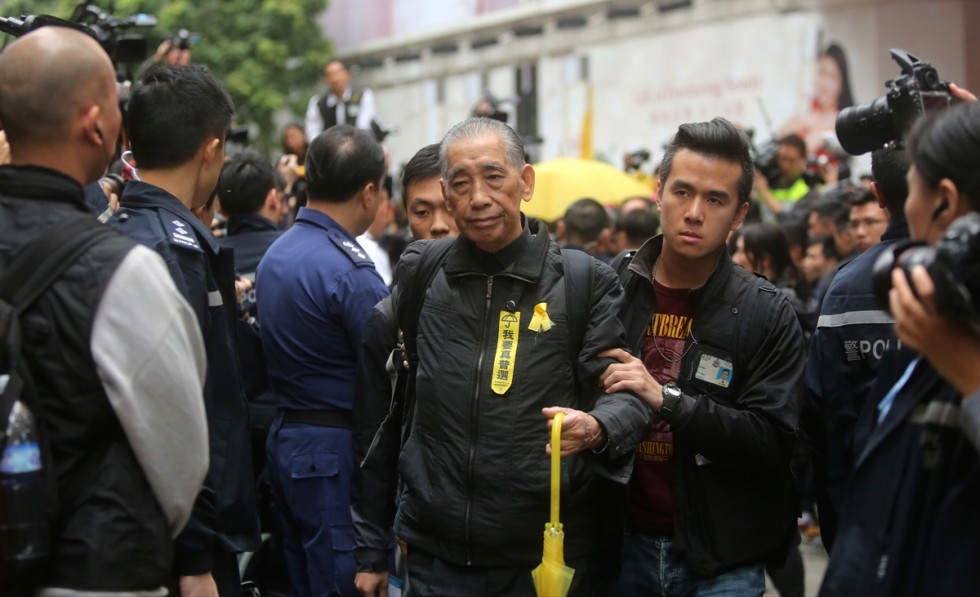
Police have arrested almost 1,000 Occupy protesters so far. Photo: Sam Tsang
So how will justice be seen to be done over Occupy?
Mass trials, prosecutions targeting just a few, or an amnesty - that is the question. Police have arrested almost 1,000 protesters so far who broke the law in the name of civil disobedience. Another 75 have turned themselves in. Police are hunting for more offenders. Will they be made to face the full force of the law? Public Eye has no idea. Some scaled the security fence of government headquarters in Admiralty, some called on people to storm the HQ, some incited protesters to begin a mass civil disobedience protest, some conspired to plot such a protest, and some used metal barricades to charge police lines. Should the book be thrown at them or should they be let off the hook for the sake of political expediency? The three initiators of Occupy Central who surrendered themselves will admit only to illegal assembly. Likewise for the politicians - and the media boss who bankrolls them - who all made a big show of being arrested without resistance during the Admiralty clearance. Presumably, they will all admit guilt. Otherwise, they will turn their grandstanding surrender into a farce. Admitting to peaceful participation in an illegal assembly is no big deal. A lenient judge would probably let them off with a warning. Maybe that is why many smiled or shouted slogans while surrendering or being arrested. But will those whose lives were turned upside down by Occupy settle for lawbreakers being let off lightly? Most of those arrested during the 79 days of protests have been released unconditionally after refusing bail. Commissioner of Police Andy Tsang Wai-hung has set a three-month deadline to decide who to charge and with what. Is a lenient approach in the works to put this divisive chapter in our political history behind us? Tsang talked tough about targeting the instigators. But the movement was leaderless, so who exactly are they? What will it do to our rule of law if the many thousands who paralysed our streets for so long are not made to face the consequences of their actions? Will the 1.8 million Hongkongers who backed an anti-Occupy campaign cry foul if only a few instigators are brought to justice? Will the pan-democratic camp scream political persecution if we see mass trials? The occupied streets are now clear, but the road ahead is lined with booby traps.
Claim of external aid for protesters doesn't add up
Is he talking through his rear end, or does he know something we all don't know? Chen Zuoer, former deputy director of the State Council's Hong Kong and Macau Affairs Office and now a top adviser to Beijing, has made the jaw-dropping claim that an American organisation bankrolled supplies "worth at least HK$200 million to HK$300 million" for the Occupy camps. That is an awful lot of money, whichever way you look at it. Fantasy or fact? Public Eye does not know. But the starting point should be to ask ourselves if the tents, free food, water, blankets, goggles and hard hats that we all saw at the various protest sites were worth HK$300 million. If no, then let us lay to rest this business about external forces being involved. If the supplies are indeed worth HK$300 million, then how credible is the claim that it all came from local donations, given the well-organised way the supplies were distributed? What struck us was the huge pile of abandoned tents and other supplies amassed during the clearance operations. If it was your own tent, would you not have kept it?
Michael Chugani is a columnist and television show host. [email protected]
PUBLISHED : Wednesday, 17 December, 2014, 4:25am
UPDATED : Wednesday, 17 December, 2014, 4:25am
How will justice be seen to be done in wake of Occupy Central protests?

Michael Chugani

Police have arrested almost 1,000 Occupy protesters so far. Photo: Sam Tsang
So how will justice be seen to be done over Occupy?
Mass trials, prosecutions targeting just a few, or an amnesty - that is the question. Police have arrested almost 1,000 protesters so far who broke the law in the name of civil disobedience. Another 75 have turned themselves in. Police are hunting for more offenders. Will they be made to face the full force of the law? Public Eye has no idea. Some scaled the security fence of government headquarters in Admiralty, some called on people to storm the HQ, some incited protesters to begin a mass civil disobedience protest, some conspired to plot such a protest, and some used metal barricades to charge police lines. Should the book be thrown at them or should they be let off the hook for the sake of political expediency? The three initiators of Occupy Central who surrendered themselves will admit only to illegal assembly. Likewise for the politicians - and the media boss who bankrolls them - who all made a big show of being arrested without resistance during the Admiralty clearance. Presumably, they will all admit guilt. Otherwise, they will turn their grandstanding surrender into a farce. Admitting to peaceful participation in an illegal assembly is no big deal. A lenient judge would probably let them off with a warning. Maybe that is why many smiled or shouted slogans while surrendering or being arrested. But will those whose lives were turned upside down by Occupy settle for lawbreakers being let off lightly? Most of those arrested during the 79 days of protests have been released unconditionally after refusing bail. Commissioner of Police Andy Tsang Wai-hung has set a three-month deadline to decide who to charge and with what. Is a lenient approach in the works to put this divisive chapter in our political history behind us? Tsang talked tough about targeting the instigators. But the movement was leaderless, so who exactly are they? What will it do to our rule of law if the many thousands who paralysed our streets for so long are not made to face the consequences of their actions? Will the 1.8 million Hongkongers who backed an anti-Occupy campaign cry foul if only a few instigators are brought to justice? Will the pan-democratic camp scream political persecution if we see mass trials? The occupied streets are now clear, but the road ahead is lined with booby traps.
Claim of external aid for protesters doesn't add up
Is he talking through his rear end, or does he know something we all don't know? Chen Zuoer, former deputy director of the State Council's Hong Kong and Macau Affairs Office and now a top adviser to Beijing, has made the jaw-dropping claim that an American organisation bankrolled supplies "worth at least HK$200 million to HK$300 million" for the Occupy camps. That is an awful lot of money, whichever way you look at it. Fantasy or fact? Public Eye does not know. But the starting point should be to ask ourselves if the tents, free food, water, blankets, goggles and hard hats that we all saw at the various protest sites were worth HK$300 million. If no, then let us lay to rest this business about external forces being involved. If the supplies are indeed worth HK$300 million, then how credible is the claim that it all came from local donations, given the well-organised way the supplies were distributed? What struck us was the huge pile of abandoned tents and other supplies amassed during the clearance operations. If it was your own tent, would you not have kept it?
Michael Chugani is a columnist and television show host. [email protected]
- Joined
- Nov 13, 2014
- Messages
- 272
- Points
- 0
Justice secretary Rimsky Yuen rejects criticism he 'indulged' government over Occupy Central
Court injunctions serve to uphold rights under civil law, justice secretary argues
PUBLISHED : Wednesday, 17 December, 2014, 4:25am
UPDATED : Wednesday, 17 December, 2014, 4:25am
Joyce Ng [email protected]
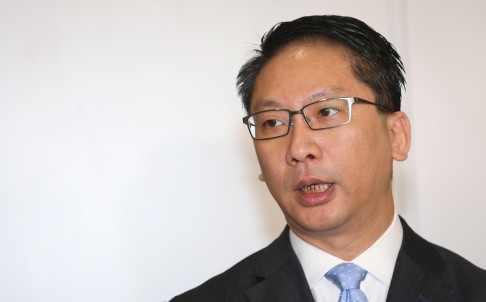
Rimsky Yuen has drawn criticism from his own secondary school.
The justice secretary has defended himself against criticism from members of his alma mater that he has exploited the courts in handling the Occupy protests.
Rimsky Yuen Kwok-keung said yesterday that he disagreed with the views expressed by alumni, pupils, parents and former teachers of Queen Elizabeth School in a Monday newspaper advertisement that accused him of failing in his job.
The ad, placed by the group of 270, slammed Yuen for "indulging" the government, which hid behind civil court cases sought by private parties to clear Occupy sites in Mong Kok and Admiralty and solve what was supposed to be a political problem.
"This view has been stated for quite a while. But excuse me, to be frank, I don't agree with what they say," Yuen said.
He said there were considerations of civil law as well as criminal law, which would mean prosecution, such as for taking part in unauthorised assemblies.
"You cannot say that because there is a criminal side [to the protests], we should not let others seek an injunction to protect their rights under civil law."
Yuen also addressed another point made in the ad, that he had met the minibus and taxi operators that applied for the court orders. That meeting raised doubts that public money had been used to help the litigants.
"This is a misunderstanding," he said. "The incident is rare. Very few injunctions come under this kind of situation, and therefore we must have meetings to give the police advice. We did not give the plaintiffs legal advice."
The police were involved because, in the injunction cases targeting the Mong Kok site, the court allowed the applicants to seek help from officers if they were unable to clear the area.
The ad urged Yuen to uphold the school motto to "prepare yourself that you may serve" and stay true to his conscience.
Earlier in the day, Yuen attended a law conference in Macau in which he spoke about progress in setting up a "fugitive offenders agreement" and a "mutual legal assistance agreement" between Hong Kong and Macau.
Hongkongers charged in Macau could at present escape court proceedings as long as they stayed away from the former Portuguese enclave, he noted. The two governments were in the final stage of forming a joint task force and would prepare the needed legislation after signing the deals.
- Joined
- Nov 13, 2014
- Messages
- 272
- Points
- 0
Occupy Central founders vow to keep fighting for democracy in Hong Kong
In wake of protests, three leaders insist battle for democracy is far from over and say they will urge lawmakers to block 2017 proposals
PUBLISHED : Thursday, 18 December, 2014, 12:18pm
UPDATED : Friday, 19 December, 2014, 4:16am
Joyce Ng [email protected]
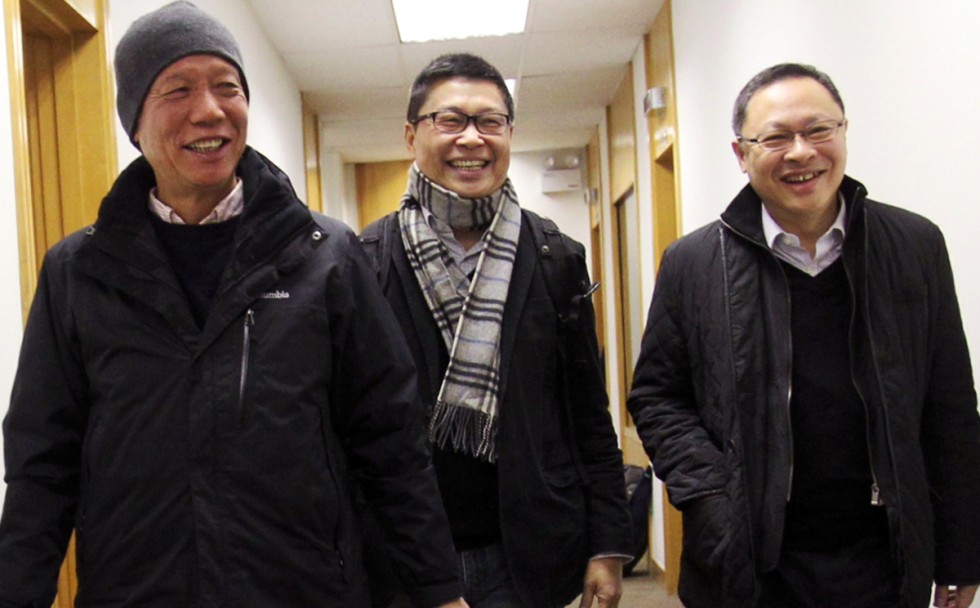
(From left) Reverend Chu Yiu-Ming, Dr Chan Kin-man and Benny Tai Yiu-ting at Commercial Radio yesterday. Photo: May Tse
Occupy Central founders yesterday vowed to keep fighting for a democratic Hong Kong - starting by pushing lawmakers to veto the government's political reform proposal next year.
A week after the mass street protests ended, the three founders appeared on a radio programme and also said they would help hopefuls in next year's district council elections.
"Although the occupation [of roads] has ended, Occupy Central has not finished its job," co-founder Dr Chan Kin-man said.
"We will have to make sure lawmakers veto the government proposal" for reforms in the 2017 chief executive election Chan said. A second round of public consultation on the reforms is expected to begin early next month.
A finalised proposal - which is expected to reflect Beijing's restrictive framework, virtually barring pro-democrats from running for the city's top job - is expected to face a Legislative Council vote in the middle of next year.
Chief Executive Leung Chun-ying has indicated that the government would try to lobby the support of several pan-democratic legislators to get the necessary two-thirds majority to pass the proposal.
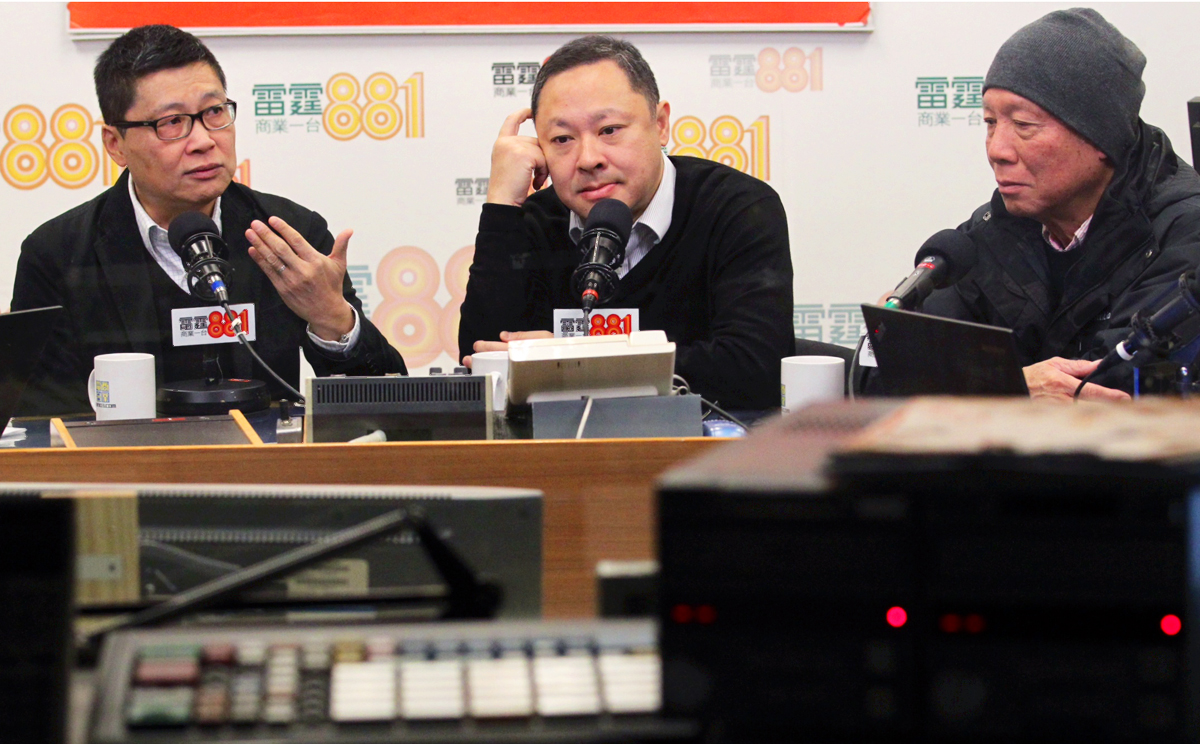
(From left) Occupy founders Chan Kin-man, Benny Tai Yiu-ting, and Reverend Chu Yiu-ming to wrap up the movement on Commercial Radio One Station. Photo: May Tse
Post-Occupy, Chan said he planned to take on the role of "facilitator" among civil groups to push for universal suffrage, while co-founder Benny Tai Yiu-ting said he would continue his academic work and contribute to the cause through writing and education. Tai is an associate professor of law at the University of Hong Kong.
Reverend Chu Yiu-ming, a 70-year-old Baptist minister and activist, said he found himself "not having the strength" to stay on the front line after Occupy but would assist in the district council elections by providing a network and advice to candidates.
That election is seen as a defining test of public opinion on various political parties.
Chan noted that several volunteers in the pro-democracy movement were interested in running, with some targeting uncontested districts or looking to challenge incumbents from the pro-establishment camp.
Chan urged political parties to attract more young people. "There is a huge gap between the pro-democracy parties and the civil society. The parties must work hard to bridge the gap," he said.
Meanwhile, addressing the possibility of the Occupy leaders facing prosecution after turning themselves in to police last month, Tai said they may admit to the charge of organising an unauthorised assembly, as well as taking part in it.
But they would not admit to "inciting" people to take part in the protests, Tai said.
He said there were about 20 cases against him pending at the Small Claims Tribunal filed by people who accused him of disrupting their businesses among other allegations.
The compensation requested amounts to several hundred thousand dollars.
Police said this week that close to 1,000 people had been arrested at sites in Admiralty, Mong Kok and Causeway Bay since the Occupy Central protests began on September 28.
- Joined
- Nov 13, 2014
- Messages
- 272
- Points
- 0
After Occupy, more Hongkongers back government’s reform package, study finds
PUBLISHED : Thursday, 18 December, 2014, 6:17pm
UPDATED : Friday, 19 December, 2014, 1:46am
Tony Cheung and Joyce Ng
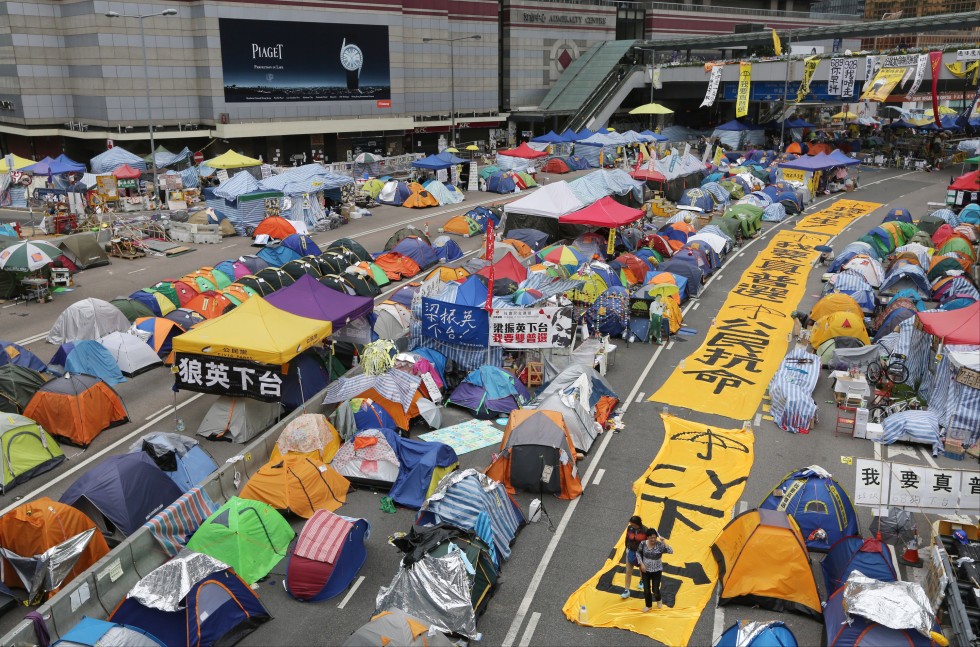
Chinese University study finds more people want Legco to approve Beijing's electoral reform package. Photo: Sam Tsang
More Hongkongers now want legislators to approve the government's electoral reforms next year than before the start of the Occupy Central civil disobedience action for democracy, a university poll has found.
The Chinese University survey findings raise questions about whether the 79-day Occupy protests have backfired in terms of public support.
Pan-democratic lawmakers have vowed to veto the government's reform framework if it follows Beijing's rules to deprive Hongkongers of a free choice of candidates in the 2017 chief executive election.
Student leaders and co-organisers of Occupy back the pan-democratic stance.
Professor Francis Lee Lap-fung, one of the pollsters with the university's school of journalism and communication, believes the changes in sentiment could, ironically, have resulted from political discussion encouraged by the Occupy movement.
"Hong Kong residents gained an understanding of the issue," Lee said yesterday. "Maybe they have some ideas about the movement, and now have second thoughts about whether the package should be supported."
The university interviewed 1,011 people from December 8 to 12 - the last day coinciding with the police's clearance of the Occupy base camp in Admiralty.
In the poll, 38 per cent said the Legislative Council should endorse the government's reform package even if it followed Beijing's restrictive framework. That was nine percentage points higher than in a survey before the protests began on September 28.
Support for lawmakers to vote down the framework fell 10 percentage points to 43 per cent.
Lee said poll respondents who identified themselves as having moderate political views - in between the pro-establishment and pan-democratic positions - or no orientation at all drove the shift in sentiment.
Within those two groups, 38 and 25 per cent wanted the government's reforms vetoed, respectively - 14 and 17 percentage points lower than in September.
Three-quarters of those who aligned themselves with the pan-democratic camp opposed the package - three percentage points higher than previously.
About 51 per cent were dissatisfied with how the government handled the protests, and 53 per cent believed it should have made concessions to solve the political impasse.
Labour Party chairman and lawmaker Lee Cheuk-yan conceded the findings showed public support for Occupy had declined, but said his pan-democratic camp remained determined to veto the package.
"Public support will rebound when the government starts the second stage of public consultation [next month] and when we approach different communities to tell people about it," he said.
Occupy Central co-founder Dr Chan Kin-man said that while he noted some people had changed their view, overall there was still a bigger proportion of people in favour of a veto.
"The results show that Occupy became more unpopular towards the end due to the traffic jams," Chan said. "But I believe that ... people will forget these small inconveniences and will still be fighting for democracy."
- Joined
- Nov 13, 2014
- Messages
- 272
- Points
- 0
Occupy is over, so let's have some order on our roads again
Now that order has been restored to protest sites, let's try having some on our roads
PUBLISHED : Friday, 19 December, 2014, 5:13am
UPDATED : Friday, 19 December, 2014, 5:13am
Mike Rowse
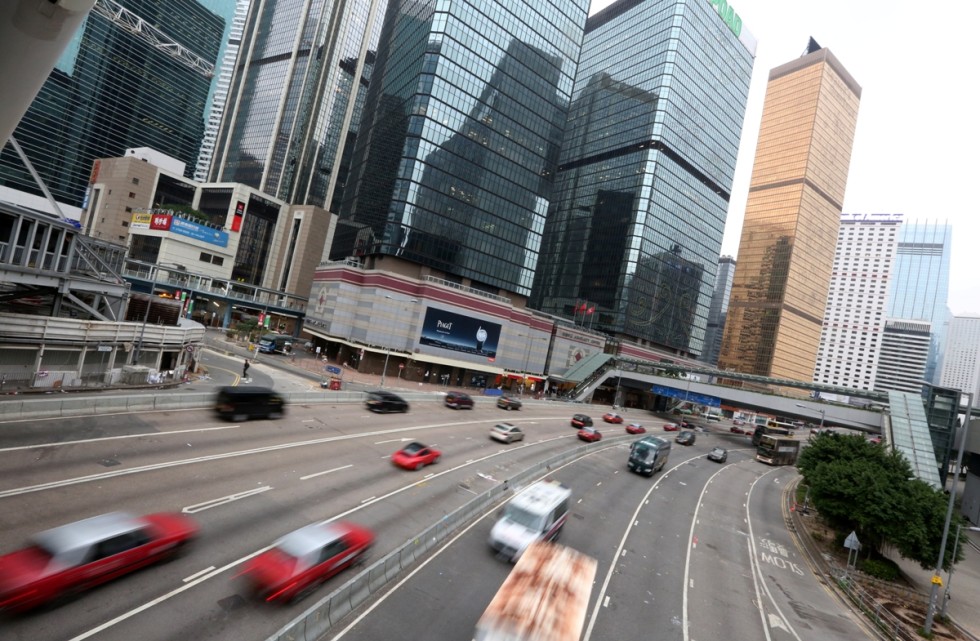
Occupy is over, so let's have some order on our roads again
As the occupation phase of the "umbrella movement" winds to a dignified close - a credit, by the way, to both sets of players - I have been reflecting on how my own mood and the behaviour of other people not directly involved swung back and forth over the last two-and-a-half months.
During the first week it all seemed rather exciting. Like many other Mid-Levels residents, I was forced to go home every night on the escalator, as vehicular access in the evening was extremely time-consuming, if not impossible.
The second week was a full working one, so the novelty was beginning to wear off a bit, but memories of the tear gas were still quite strong, so the need to show solidarity with the students by suffering stoically in one's own middle-class way overcame any feelings of irritation.
I noticed during the same two-week period that most drivers, though all thoroughly inconvenienced, were rather more cooperative than usual. They gracefully allowed other vehicles into their lane and generally refrained from tooting their horns.
By the third week, I was beginning to get annoyed. True, Queensway had reopened and it was now possible to use Garden Road again, but the roads were so congested it slowed everything down. On the rare occasion I was able to get a taxi, the much longer travelling time meant at least an extra HK$10 on the meter.
"It's time those damned kids pulled back. Don't they have an exit strategy?"
The broad mass of motorists had by now lost patience, too. Going through on red became all too common. Crossing double white lines, let alone the single solid one when it was on your side, became an everyday event.
"If the kids can misbehave, so can we," seemed to be the general attitude.
Well, we all need to join hands to snap out of it. Once the police have had a week's rest, I want to see them back out there issuing tickets: for running red lights, illegal parking and - my special bugbear - for refuse trucks that fail to cover the load properly and spew waste paper and goodness knows what else all along the highway. Lock 'em up and throw away the key!
Come on, Hong Kong, let's get back to work.
Mike Rowse is managing director of Stanton Chase International and an adjunct professor at Chinese University. [email protected]
- Joined
- Nov 13, 2014
- Messages
- 272
- Points
- 0
Hong Kong activists on mission to reach Xi Jinping turned back at Macau ferry terminal
PUBLISHED : Friday, 19 December, 2014, 11:29am
UPDATED : Saturday, 20 December, 2014, 3:36am
Peter So, Jeffie Lam in Macau and Shirley Zhao
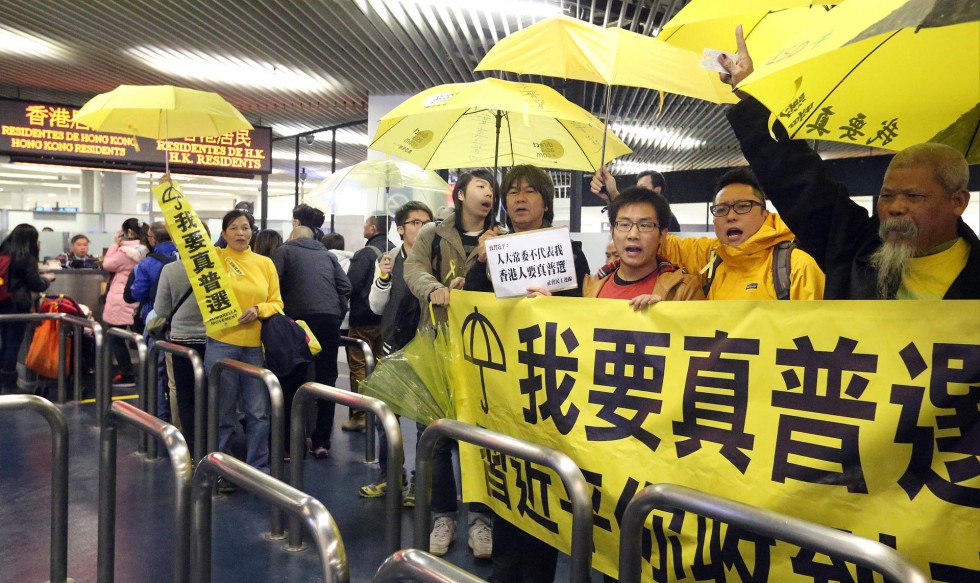
A group League of Social Democrats members protest at the ferry terminal before being sent back to Hong Kong. Photo: K.Y. Cheng
Rally organisers planning pro-democracy protests during President Xi Jinping's two-day visit have been told by Macau police to amend their routes to quieter streets and locations farther away from Xi's hotel.
The order came as 14 activists from Hong Kong and four Apple Daily reporters were denied entry to Macau yesterday, ahead of the 15th anniversary of the former Portuguese enclave's handover to China.
As Xi attends the celebrations, hundreds of residents are expected to turn out this afternoon for the rallies, organised separately by Macau's Labour Party and Macau Conscience, to call for democracy, a clean government and better labour rights.
Macau Conscience had planned to protest at Colina da Penha near Xi's hotel, but were told on Wednesday to move to a farther location, group member Jason Chao Teng-hei said.
"For the first time, the police have informed us of the decision only a few days before the protest and have therefore left us no time to appeal against it," Chao said.
Xi arrived in Macau yesterday, and more than a dozen police officers blocked several group members - who were holding the yellow umbrellas that symbolised Hong Kong's Occupy Central movement - as they neared Colina da Penha, he said.
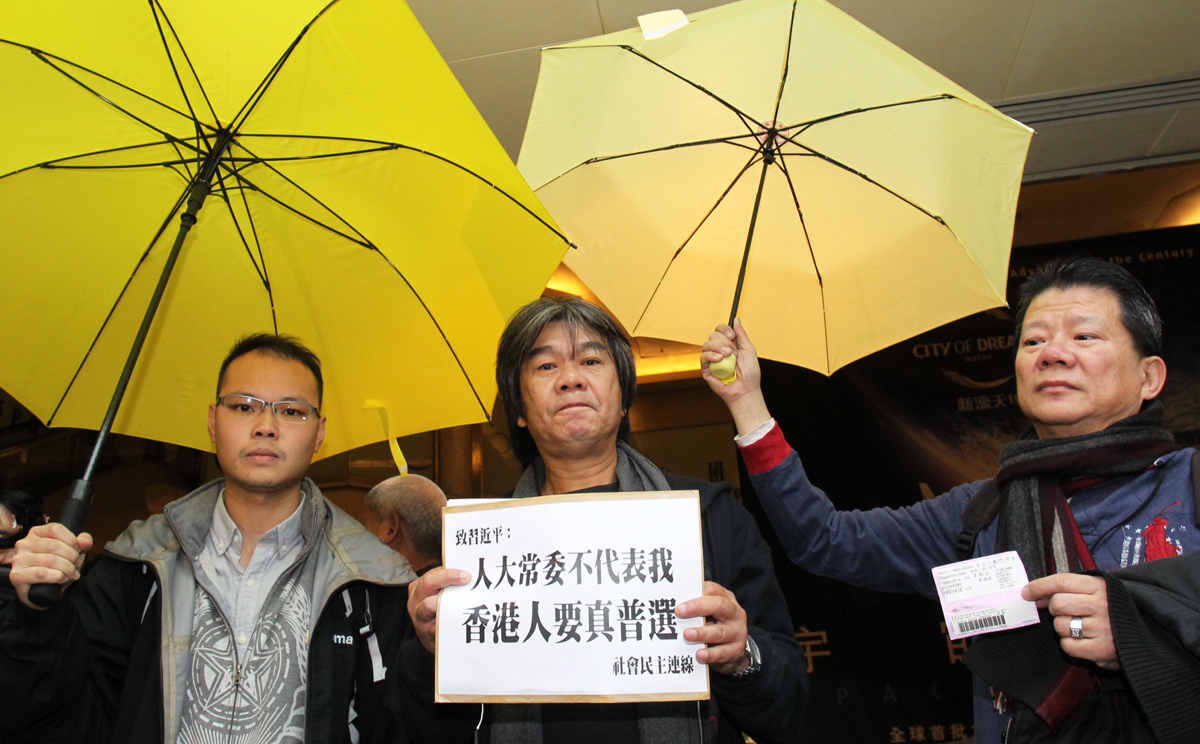
"Long Hair" Leung Kwok-hung (centre) and two other activists at Sheung Wan ferry pier leaving Hong Kong. Photo: May Tse
Police had also told the Labour Party to make a detour via quieter streets during its march, deputy chairman Lee Kin-yun said. But the party did not plan to get near Xi anyway. Lee said. "It is impossible to approach him because the cordoned-off area is very extensive," Lee said.
Meanwhile, a group of Hong Kong activists led by League of Social Democrats chairman and lawmaker Leung Kwok-hung were denied entry to Macau.
The activists, their yellow umbrellas raised, were stopped at immigration counters within half an hour of their arrival around noon at the Outer Harbour ferry terminal and turned back.
Four Apple Daily reporters, who planned to cover Xi's visit, were also refused entry.
Back in Hong Kong, the activists showed documents declaring they had been denied entry because of "strong evidence" that their activities would threaten Macau's public safety.
Leung said the authorities barred people from carrying umbrellas into ceremonial venues. "I've never seen such a barbaric decision before. It's really funny."
Democrat Andrew Wan Siu-kin, who was also turned back, said officers even detained people with the same names as pan-democrats.
A 50-year-old known as Wu Chi-wai and an 80-year-old called Chan Wai-yip - whose names were the same as those of Democratic Party and People Power lawmakers - were held.
The protest at the Macau ferry pier was filmed by local officials.
- Joined
- Nov 13, 2014
- Messages
- 272
- Points
- 0
Blame Hong Kong's inept officials for blackening police's name
Stephen Vines says society will suffer for the politicisation of the force
PUBLISHED : Friday, 19 December, 2014, 12:38pm
UPDATED : Friday, 19 December, 2014, 12:38pm
Stephen Vines
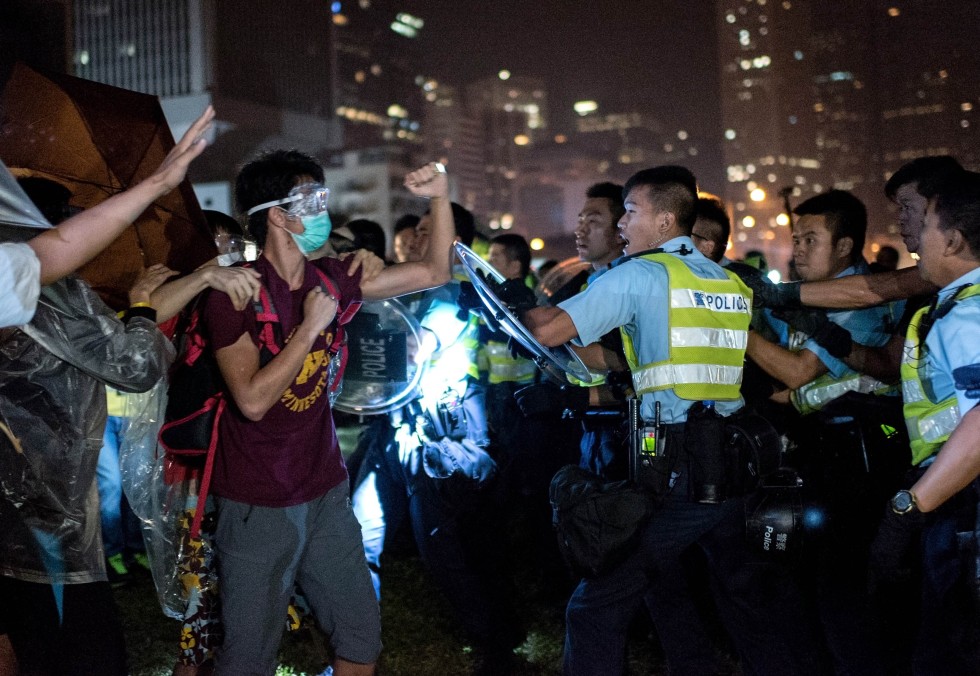
There are valid questions to be asked about the way the police acted, including allegations of assault. Photo: AFP
One of the most damaging legacies of the "umbrella movement" has been the determination of the Leung Chun-ying administration to politicise the police force. Even now, Leung continues to insist that the fundamental political and social issues that galvanised this movement should be viewed solely through the prism of being a law-and-order problem.
As a consequence, the police force has been used as the government's battering ram, placing its officers on the front line of the political reform debate, in place of the administration's leaders who lack the courage to stand there.
Worse, in many ways, have been the attempts by the wider anti-democrat movement to hijack the police force for their own political ends, as they seek to portray the police as stalwarts of their camp.
Unsurprisingly, this has taken its toll on public perceptions of the force. A recent opinion poll showed a sharp drop in its popularity, leaving the force trailing the People's Liberation Army garrison.
My personal experience of nearly all encounters with the police left me with a strong sense of both their professionalism and commitment to duty. Yet, even someone like me, who is loath to become a police critic, is now having doubts.
It is almost certainly no coincidence that Hong Kong's present police commissioner is arguably the most political chief ever to lead the force. Andy Tsang Wai-hung is also a highly controversial figure within the force, having done little to win the confidence of his frontline officers. However, he is highly prized in both Beijing and among Leung's clique of officials.
They appear not to have noticed Tsang's almost total disappearance from the public eye during the protests, only emerging for a press briefing once the last protest site was cleared. No wonder officers raise questions about his leadership from the rear.
But there are bigger questions about his readiness to have the force used as a political tool. When he did finally emerge, he was quick to emphasise that the police would now be spending their time trying to uncover the "instigators" of the protests.
I rather suspect this will not involve a visit to Upper Albert Road, the office of the chief executive, who bears more responsibility than any other individual for these events.
On the contrary, Tsang wants the police to act on the basis of a conspiracy theory, with a narrative suggesting a lack of spontaneity in these protests and the presence of black hands (foreign, if at all possible) directing these events.
None of this is to suggest that the police should be removed from public order duties; this is clearly absurd. However, there are valid questions to be asked about the way the police acted, obviously including allegations of assault, but more widely looking at whether their deployment aggravated the protests.
Memories are short but police veterans will tell you how the force, under the far more inspiring leadership of Dick Lee Ming-kwai, is remembered for the highly adroit way it policed the 2005 World Trade Organisation conference, which saw protests by Korean farmers with a reputation for violence. Even the protesters left Hong Kong marvelling at the way Lee handled things.
Today's protesters have not been offering similar plaudits for Tsang, even though many of the frontline officers they met on the streets earned respect from demonstrators.
This, unfortunately, does not diminish the wider impression that the force has somehow become the main means of tackling what should be a political problem. If this process of politicisation continues, another much cherished aspect of Hong Kong life will have been undermined.
Stephen Vines is a Hong Kong-based journalist and entrepreneur
- Joined
- Nov 13, 2014
- Messages
- 272
- Points
- 0
PUBLISHED : Friday, 19 December, 2014, 6:05pm
UPDATED : Friday, 19 December, 2014, 6:05pm
15 minutes with Mr Lau: One taxi driver’s take on his Occupy 'woes'

Jason Y Ng
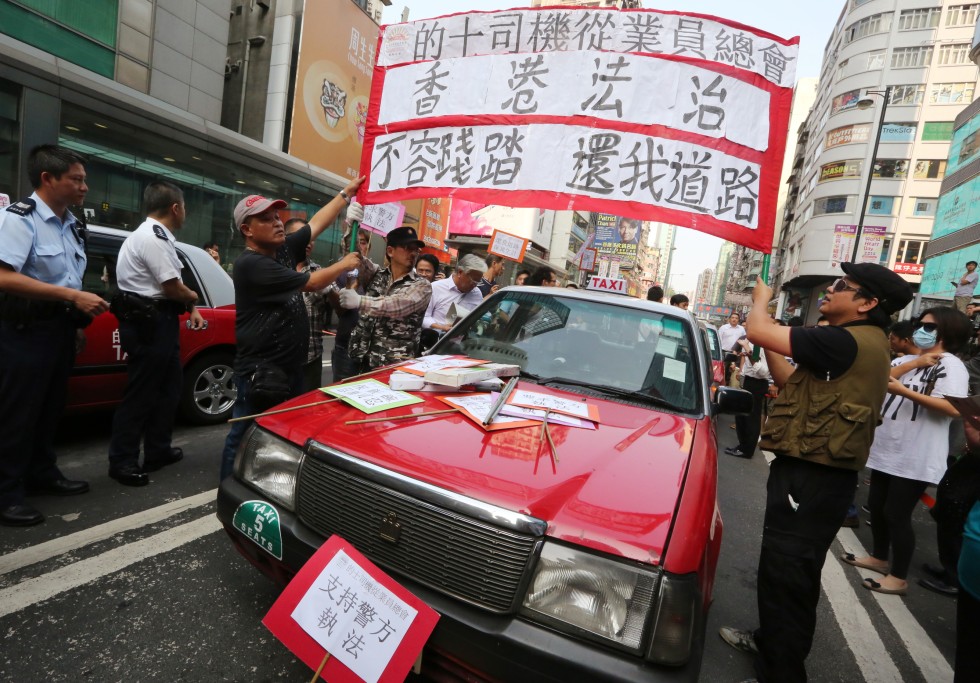
Taxi drivers protest against Occupy protesters in Mong Kok on October 22, 2014. Photo: Felix Wong
I finished dinner in Causeway Bay and hailed a taxi outside the Excelsior Hotel. The driver was a middle-aged man with grizzled hair and a penchant for small talk. Small talk is not my thing, much less with a stranger at the end of a long day. As I was disentangling my earphones to signal my desire for a quiet ride, the driver said something that piqued my interest.
“Look at this mess,” he complained, pointing at the snarled traffic on Gloucester Road. “We had 79 days of heaven and now we are back in hell.”
I wasn’t sure if I had heard him right. My impression was like everyone else’s – that taxi drivers were upset with the Umbrella Movement because main arteries like Harcourt Road and Nathan Road had been occupied. And for those who are in the business of moving people around, blocked streets mean bad business.
“How do you mean?” I probed, glancing at his ID on the dashboard. His name was Lau.
“I mean business was much better during the protests,” Mr Lau declared.
“I was told your income fell by 15 to 30 per cent because the streets were blocked.” I remembered reading those figures in the paper.
“That’s a load of crap,” he said. “For 79 days, I worked less and made more. Who doesn’t like that?”
“You need to explain to me how that worked, because that’s not what we think happened.”
“It’s simple. Traffic was way better during the protests. There were no double-deckers taking up multiple lanes, and more people took taxis because buses and mini-buses were re-routed.”
“But wasn’t it a big hassle to have to go around the protest sites?”
“It was confusing the first couple of days but people quickly adapted. Say, if I were to go eastbound from Sai Ying Poon to Causeway Bay, I would take Lung Wo Road and bypass the protest zone in Admiralty.” He proceeded to give me a few more examples of how drivers would dodge the occupied areas by taking alternate routes, both on the Hong Kong side and in Kowloon.
“And there’s one more thing,” Mr Lau continued to enlighten me. “With so much police presence everywhere, we had fewer idiots double-parking or unloading stuff where they weren’t supposed to. Drivers were on their best behaviour and many people simply left their cars at home to avoid trouble.”
“Exactly how much better was business?” I pressed, wanting details.
“On average, I made about $300 more every day.”
“What percentage is that compared to what you made before or after the protests?”
“Well, I pull in roughly $1,200 on a good day and $800 on a slow one. So my income went up by more than 30 per cent during those 11 or so weeks.”
“You said you had worked less to make more. It doesn’t seem to add up.”
“Why not? With better traffic and a constant flow of customers, my meter jumped faster. I could finish my shift two to three hours early on most nights.”
“Was it just you or was it the case for everyone else?”
“We all drive on the same streets. Why would I be any different from the next cab driver?”
I shook my head in disbelief, shoving my still tangled earphones back into my bag. I recalled images of irate taxi drivers charging at student protesters and taking down their barricades, all because their livelihood had been ruined by traffic disruptions.
“I had no idea. Like most people, I just took the news reports I read at face value,” I confessed. “If the protests were good for business,” I asked, “then does it mean you support the students?”
“I don’t support anybody. I’m just an ordinary person trying to make a honest living.” He heaved a sigh and continued, “I’m just telling you what I see. Traffic was great for 79 days and now things are back to ‘normal,’ the normal traffic jams that had cost me over an hour tonight to go from Diamond Hill to Causeway Bay before I picked you up at the Excelsior.”
“Then, Mr Lau, you must tell every passenger what you have just told me! You should phone in to a radio show or talk to a reporter.” I urged. “Everyone believed what they saw on the news and blamed the students for things they didn’t do. That’s not fair to them!”
“Look, I’m not an activist and I need to be careful whom I talk to. You look like a nice enough guy and so I assume you aren’t one of those Blue Ribbons. I don’t want any trouble...”
That’s when I saw my apartment building and interrupted Mr Lau: “Wait, sorry, turn left at the traffic lights please.” I gave him a better-than-usual tip and thanked him for the conversation. He thanked me in return and waved goodbye before pulling off.
I went home and turned on my computer. I decided to do what Mr Lau did not want to do – I would tell everyone what he had told me. It was the right thing to do.
Similar threads
- Replies
- 0
- Views
- 229
- Replies
- 17
- Views
- 2K
- Replies
- 1
- Views
- 206
- Replies
- 4
- Views
- 522

